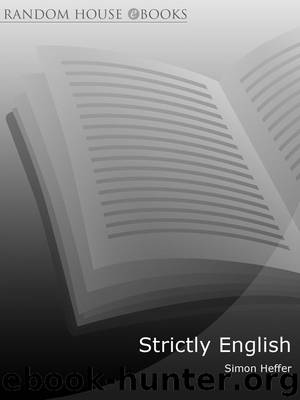Strictly English: The correct way to write ... and why it matters by Simon Heffer

Author:Simon Heffer [Heffer, Simon]
Language: eng
Format: epub
ISBN: 9781446474792
Publisher: Random House
Published: 2011-05-30T22:00:00+00:00
An extra syllable
There are several adjectives that appear to the untutored eye to be interchangeable but which, through the addition of an extra syllable, undergo a subtle change of meaning. They end in the first instance in -ic, and have an augmentation in -ical. The most obvious are historic and historical; economic and economical; magic and magical; and comic and comical. Conic and conical are less used. Tragic and tragical, and psychic and psychical, have become antique, the distinction between them lost except to the strictest pedant, and should not detain us. A variation on the theme, and worthy of note, is the pair manic and maniacal.
A moment’s thought will appear to tell the intelligent writer what the difference is between each constituent of these pairs of adjectives. A magic moment is one where something illusory or supernatural appears to have happened. A magical moment is one where it is quite obvious that something illusory or supernatural has not happened, but the ambience of the occasion could cause one to think that it might. The adjective in -ic is literal; the one in -ical metaphorical, suggesting that something has the properties or likeness of magic. The dictionary defines magical as “of or relating to magic” in the first definition, but a second one, almost as old and now more idiomatic, is “resembling magic in action or effect; enchanting”.
Yet the other pairs of adjectives have less straightforward distinctions. A historic event is one that will take its place in history; a historical one already has. If something is historical it is of the past; if something is historic it stands out, or will stand out, as a landmark in history. The dictionary notes the use of historical as a synonym for historic as an affectation of the Victorians, with no use cited since the 19th century. Therefore, we may accept that the idiomatic usages of these two words is settled, and as detailed above.
There is a greater distinction still between economic and economical. Economic has evolved into an adjective describing financial affairs, usually on a national scale, or pertaining to the management of the political economy. Therefore we have phrases such as “economic policy”, “economic crisis”, “economic recovery” and “economic considerations”. Economical is an adjective describing the frugal use of resources. If one has an economical meal, an economical holiday or an economical central heating system, one is spending as little money as possible on any of them. In the last 20 years the word has also taken on what was once an original and amusing metaphorical usage, after a senior civil servant admitted that he had been “economical with the truth”. He made his point well at the time, and everyone immediately understood what he meant, but the phrase and its adaptations have become hackneyed, and are now best avoided by thoughtful writers.
By contrast with any of the above, comic – the adjective and not the noun – and comical appear to have lost almost all distinction in meaning when one is compared with the other.
Download
This site does not store any files on its server. We only index and link to content provided by other sites. Please contact the content providers to delete copyright contents if any and email us, we'll remove relevant links or contents immediately.
Cecilia; Or, Memoirs of an Heiress — Volume 1 by Fanny Burney(32546)
Cecilia; Or, Memoirs of an Heiress — Volume 2 by Fanny Burney(31945)
Cecilia; Or, Memoirs of an Heiress — Volume 3 by Fanny Burney(31930)
The Lost Art of Listening by Michael P. Nichols(7494)
Asking the Right Questions: A Guide to Critical Thinking by M. Neil Browne & Stuart M. Keeley(5759)
We Need to Talk by Celeste Headlee(5608)
On Writing A Memoir of the Craft by Stephen King(4935)
Dialogue by Robert McKee(4389)
Pre-Suasion: A Revolutionary Way to Influence and Persuade by Robert Cialdini(4224)
I Have Something to Say: Mastering the Art of Public Speaking in an Age of Disconnection by John Bowe(3872)
Elements of Style 2017 by Richard De A'Morelli(3341)
The Book of Human Emotions by Tiffany Watt Smith(3303)
Fluent Forever: How to Learn Any Language Fast and Never Forget It by Gabriel Wyner(3077)
Name Book, The: Over 10,000 Names--Their Meanings, Origins, and Spiritual Significance by Astoria Dorothy(2979)
Why I Write by George Orwell(2945)
Good Humor, Bad Taste: A Sociology of the Joke by Kuipers Giselinde(2944)
The Art Of Deception by Kevin Mitnick(2796)
The Grammaring Guide to English Grammar with Exercises by Péter Simon(2740)
Ancient Worlds by Michael Scott(2682)
